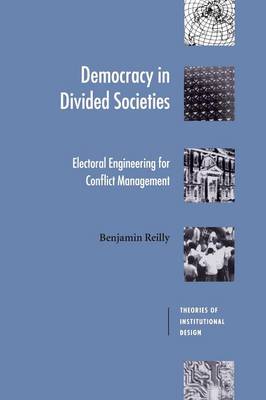Theories of Institutional Design
1 total work
Democracy is inherently difficult in societies divided along deep ethnic cleavages. Elections in such societies will often encourage 'centrifugal' politics which reward extremist ethnic appeals, zero-sum political behaviour and ethnic conflict, and which consequently often lead to the breakdown of democracy. Reilly examines the potential of 'electoral engineering' as a mechanism of conflict management in divided societies. He focuses on the little-known experience of a number of divided societies which have used preferential, vote-pooling electoral systems - such as Papua New Guinea, Sri Lanka, Northern Ireland and Fiji. Examination of these cases shows that electoral systems which encourage bargaining between rival political actors, which promote the development of broad-based, aggregative political parties and which present campaigning politicians with incentives to attract votes from a range of ethnic groups can, under certain conditions, encourage the development of moderate, accommodatory political competition in divided societies.
